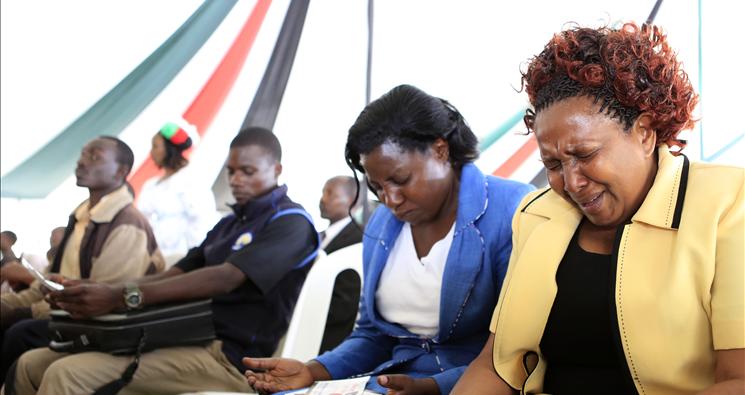EACLJ Leads Prayer for Victims of Terrorist Attack in Kenya
Written By Joy Mdivo,
EACLJ Executive Director.
The 15th of September 2013 was a dark day for Kenya, when the very popular Westgate Mall was attacked by Al Shabaab militants. The reason given for this is that Kenya's involvement in fighting the insurgents in Somalia had disrupted their activities, and so the attack was reprisal, to force Kenya to withdraw troops from Somali soil.
The aftermath of the attack is coming in ebbs and flows. There has been a dogged determination by Kenyans to refuse to be divided along religious lines. This was exhibited October 1, 2013, at the Interdenominational National Prayer Day that came at the conclusion of the official mourning period. Kenya’s President Uhuru Kenyatta, Deputy President William Ruto as well as leaders from the Christian, Hindu and Muslim faiths were in attendance.
During the prayers, EACLJ's Chairman Bishop Mark Kariuki led the Nation in praying for our children, for their protection during these perilous times.
President Kenyatta reiterated that Kenya will not ignore her international obligations to fight terror. He admitted there were glaring errors revealed in response to the attack, and promised to set up a commission of inquiry to determine what improvements can be made in the future. Bishop Mark had earlier led a team of Christian church leaders to the site of the attack where they held public prayers, as well as issued a statement to condemn the attack.
They also called for the unity of Kenyans to prove to the Al Shabaab terrorists that they shall not be intimidated.
In a similar show of unity, religious leaders at the coastal city of Mombasa also condemned the attacks. A cross section of Muslim, Hindu and Christian clerics came together in a press conference to express solidarity with the families of the victims and to call for swift action against those found complicit in helping the terrorists succeed in the attack.
Criticism has been leveled against the Intelligence Unit, the Police, the Internal Security apparatus, the Immigration department as well as the laxity of the citizens in reporting suspicious activity.
Members of the National Assembly probing the said departments have also called for the UNHCR to relocate all Somali Refugees to other nations and forthwith close all their camps in Kenya. According to the UNHCR, Kenya is host to over 500,000 Somali refugees, though there are many who come into the country without registering with the UNHCR. The number of Somali Nationals residing in Kenya could well be close to a million. Kenya has been host to the Somali refugees of a continuous basis for the last three decades.
It is believed that many of the final hostages were actually killed when it became clear that there was no way out.
The Kenya Defence Forces ask Kenyans to prepare for the harsh reality: that most of the missing could have been killed or have died from unattended wounds in the aftermath of the attack.
There are reports that six of the attackers have been killed in the final onslaught. Authorities believe the building the terrorists also wired the building with explosives. Anti-bomb experts are working to detonate them.
This article is crossposted on the EACLJ, our international affiliate, website.
